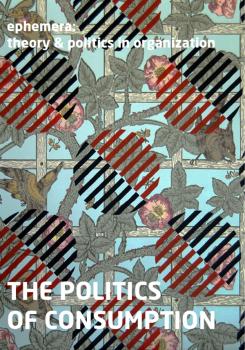For more information about Royal Holloway, please see this promotional video. To see a promotional video for the MA Consumption, Markets & Culture see here. To see a promotional video for the Royal Holloway School of Management, click here.
For more information about the Royal Holloway MA Marketing and MA Consumption, Culture & Marketing and the application process see here.
To get an understanding of the unique values that underly the MA Marketing and MA Consumption, Culture & Marketing programme please read these blog posts: Value of Scholarly Values, Importance of Reading and Morris Holbrook and Business Interest in Education.
To see examples of previous students work please click through to see the work of Yelena Sherbakov, Igor Korovenkov, Klara Scheurenbrand, Christina Demertsidou, Liliya Tokmantseva, Hafez Rafirasme, Asya Medvedeva, Vera Hoelscher, Milena Citton, Tracey Wechie, Hector Murphy and Alejandro Gallindo Diego.
Thursday, 30 May 2013
Special Issue of Ephemera: Politics of Consumption
I am proud to announce that a special issue of Ephemera: Theory & Politics in Organization, that I guest edited along with Stephen Dunne and Norah Campbell, is published. As always, Ephemera is open access publishing so you can freely access content here.
The special issue follows from a conference that we organised last year in Dublin addressing the theme of the Politics of Consumption. We had an excellent conference with keynote addresses provided by Ben Fine and Kate Soper, we had an excellent panel discussion about the consumption of law by Gerry Hanlon and Stefano Harney and a panel discussion reflecting on how to think of the relationship of consumption with austerity Ireland that included the Marxist sociologist Kieran Allen. In addition, we had many excellent papers all presented in the Irish Royal Antiquarian Society in the heart of Georgian Dublin.
The special issue includes several of those papers and also a set of commentaries prompted by Stevphen Shukaitis concerning whether objects and commodities can be comrades. In this section you will find some very interesting and often counter-intuitive pieces about fascist rice, the re-radicalisation of the image of Che Guevara, the artist David Mabb discusses his radical encounters of the artwork of Popova with Morris and Olga Kravets gives an outstanding overview of how objects were consumed during the Soviet era. There is much more inside the issue as well - not least an article by leading brand theorist Adam Arvidsson and a consequent exchange between he and Detlev Zwick.
At a time when academics increasingly wonder why our labour becomes privatised by commercial publishers, Ephemera remains open-access. Please click through the links and enjoy!
Friday, 17 May 2013
The Body, Consumption & Marketing
The Body, Consumption & Marketing
11 Bedford Square on Thursday, May 23rd at 2:00
Marketing and consumer behaviour models typically frame the consumer as a decision-maker who evaluates options. At its most alienated conception, marketers are accused of imagining the person to be akin to a computer; an information processing machine that arrives at both rational and irrational outcomes. In moving away from rational model-making, experiences become privileged sites of understanding consumption but, again, analysis takes place at the level of the mind with research often taking the form of interpreting oral testimony. What happens when the body is brought to bear more strongly within our analytical frames?
There are numerous ways of thinking about the consumer body; as the central site in which consumer desire becomes stimulated, as the actuality of behaviour itself, as an externalised technology that needs to be governed through fitness regimes and bodily ideals, as the object that fails governmentality injunctions because we are always too fat, too skinny, too short, too tall, etc., as the principle site through which gender norms are experienced and performed.
This seminar seeks to consider the role of the body within consumption and marketing. Norah Campbell of Trinity College, Dublin explores futuristic conceptions of the body within science fiction depictions of the post-human whilst Liz Parsons and Emma Surman of Keele University explore the embodied experiences of marketing workers. A panel discussion will follow in which we will be joined by the philosopher, William Large of University of Gloucestershire.
The event will take place at 11 Bedford Square on Thursday, May 23rd at 2:00.
To reserve a place, please email alan.bradshaw@rhul.ac.uk
Sunday, 5 May 2013
Marketing and 'Content' in the Convergence Economy
Jaguar's new viral movie, supporting the launch of the F Type (above), follows a tradition of 'content' marketing in the prestige car business begun by BMW a decade ago. The twelve minute film called ‘Desire’, made by Ridley Scott Associates (story in Advertising Age ) stars Homeland actor Damian Lewis, and features a specially commissioned song by Lana Del Ray. The plot unwinds as a car chase across a Chilean desert, with Lewis acting the Good Samaritan (with advanced driving skills) to a woman escaping her criminal husband. There's a neat twist at the end, but no promotion, as such. The car speaks for itself. Its an expensive piece of product placement, without the need to haggle over creative control. Desire airs through video sharing on social media, principally via YouTube. BMW set the tone for this kind of car-caper content with their 2001 movie The Hire, starring Clive Owen and Madonna, with Guy Ritchie directing (see it here ). The Hire was initially sent out on DVDs and had to be put on social media by keen fans, while Desire is a purely social media phenomenon. Both efforts epitomise the focus on content that is the new frontier for marketing in the convergence economy.
'Content' is a catch-all term for entertainment or news that features a brand. If this seems a nebulous definition, that's because content can cover many things. The connecting thread of all marketing content is that it doesn't look like traditional advertising, because there's no sales pitch. There is, though, a promotional motive. It is by no means confined to car brands. Coca Cola, for example, made their content marketing strategy into content by putting a video of it on to YouTube (see it here ). The aim is to strengthen the brand's cultural presence by activating and engaging the audience. Content doesn't have to be a movie. It could be a journalist writing pieces for a brand blog, a game designer making free-to-download 'advergames' for a brand, or a digital ad agency creating memes to leverage social media sharing from topical news events, as Oreos did successfully during the Superbowl power outage a few weeks ago. It could even extend to forms of sponsorship or product placement that spin off into PR coverage or consumer-generated memes. If a product placement in a TV show happens to be on a clip that gets viewed by millions, that's content.
There are two things I particularly like about content as an idea that articulates consumer marketing practice in the convergent economy. One is that it gets beyond the spurious categorical precision that is so common in marketing, and offers a unified notion of brand presence in promotional culture. The other is that it represents the best things about marketing: great writing and visual creativity, and in so doing it moves away from the dull cognitivism and behaviourism that, still, dominate static marketing thinking.
The notion of content is sweeping marketing from all directions. A great deal of advertising is looking more like entertainment in its narrative forms, while much entertainment looks like an advertisement so packed is it with prominent brands. Even news coverage is increasingly tinged with marketing influence, because of the need for news media to position themselves as brands in a shrinking news market. Note the UK's most profitable news media brand of all, the MailOnline, which earns its 100 million readers per month not from a commitment to information, nor, arguably, to political posturing, but to the sensational story arc. This is news as marketing, positioned not against other print newspapers but against popular showbiz and news sites like MSN. Other news media are so strapped for cash flow they are over-reliant on PR releases and news agency material to fill their space, allowing marketing spin to seep through into editorial on a huge scale.
Media convergence refers to the development of hardware and software that can show all media content on the same device. Leading ad agencies now employ digital planners to show them how creative ideas might be adapted across media channels. At the moment, it is creatively and technologically difficult to make a short video for TV that also works on mobile and internet, and translates to static forms like print or banners. Promotional logic is not longer static, with a defined audience targeted by an announcement from one, identifiable, source. The logic is dynamic, with branded content driving activation through different media channels and generating new iterations of creative ideas from audience participation. For example, Heineken's brand placement in Skyfall was said to have cost scores of $millions because of the extended activation through linked TV ads and digital content built around the exposure. In the future, the technical issues may be solved and we will access all media on a single device, making content marketing even more accessible.
There is a recognition in the notion of content marketing that the most powerful way to sell brands is not to sell them at all, but to normalise them as a taken-for-granted part of our cultural experience, while, at the same time, infusing them with value through the narrative forms and visual drama of media technology. The idea of 'content' marketing mashes media genres into a seamless branded experience of media consumption.
Naturally, this blogpiece is also a piece of branded content, since a nice book has just been published by Routledge dealing with exactly this topic. Called Promotional Culture and Convergence, and edited by Helen Powell at the University of East London, the book takes an academic purview of the implications for marketing of convergence culture. Another book on the re-shaping of marketing in the convergence era will appear later this year. This one is from Palgrave MacMillan and will be called Marketing In Context. It'll be a more practitioner-focused perspective, taking in the scope of marketing but addressing the much under-played role of communication in promotional logic. The viral movie of the book is still under development.
Subscribe to:
Posts (Atom)



